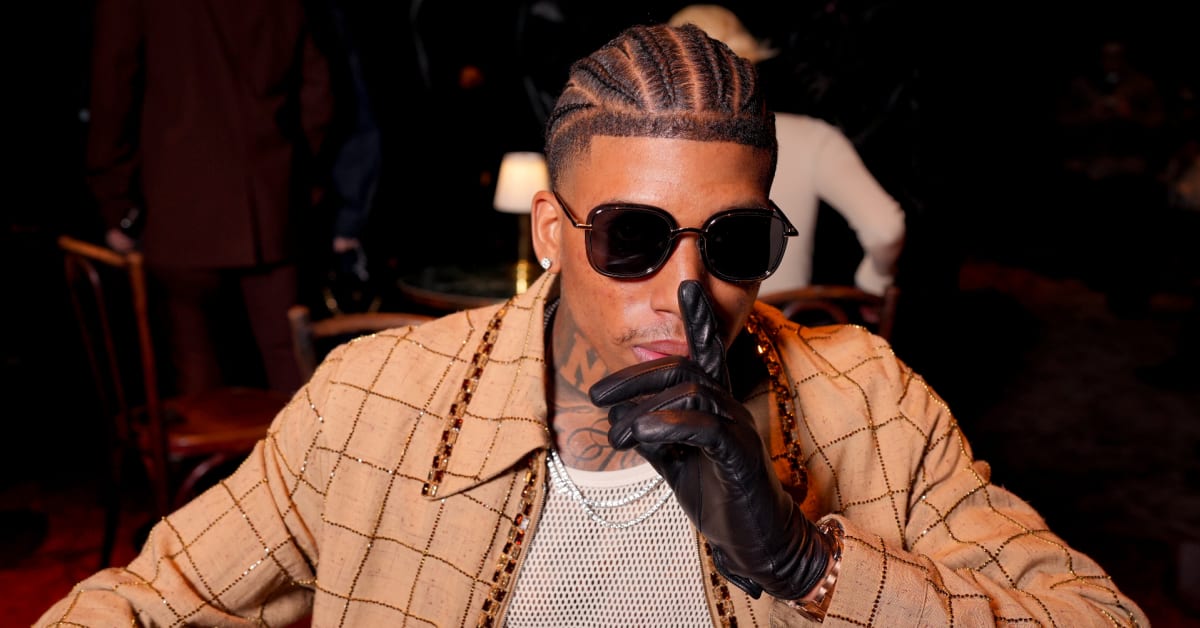With the WNBA Finals behind us and the Unrivaled basketball season on the horizon, it's safe to say that it truly has been the year of women's basketball. The WNBA consistently broke audience and viewership records all season long, and college ball didn't slack either: During March Madness, the women's title game drew more views than the men's, peaking at 24 million. So, can we put the tired old idea that women's sports will never be as popular as men's to rest yet?
Call it the Caitlin Clark effect, call it deserved, yet overdue attention; women's basketball is enjoying its time in the sun. But that spotlight is also illuminating a slightly more upsetting narrative — and it involves salary.
On Wednesday, Oct. 16, Angel Reese spoke out about her WNBA salary. "I just hope y'all know, the WNBA don't pay my bills at all. I don't even think it pays one of my bills. Literally," the Chicago Sky forward said on Instagram Live, according to ESPN. She went on to confirm that the $73,439 rookie salary she earned in 2024 was outpaced by her monthly rental cost of $8,000 per month. Of course, Reese isn't living solely on her WNBA salary; she previously told ESPN that her WNBA checks were "a bonus" that came "on top of the other endorsements that I'm doing," which include brands like Reebok, Good American, Tampax, Mielle, and others. Reese's last year at LSU, On3 gave her a name, image, and likeness valuation of $1.8 million.
Despite the fact that it doesn't make up her entire income, considering how much attention Angel Reese has brought to both college basketball and the WNBA over the past two years, her WNBA salary seems small — especially when you compare it to NBA rookie salaries. This again.
Another example: First overall WNBA draft pick Caitlin Clark earned $76,535 her first year, and is expected to make $338,056 over her first four years. The first overall 2023 NBA draft pick, Victor Wembanyama, signed a four-year, $55.7 million rookie contract to play for the San Antonio Spurs; he earned over $10 million in year one. Not just that, but the 30th pick made over $2 million in year one, nearly 27 times more than Clark's or Reese's salaries.
This issue has added fuel to the ongoing debate about pay equity for women's sports, and the changes that need to be made off the court for the WNBA, now and into the future. "Honestly, y'all should be embarrassed for even posting this salary. Women deserve better," wrote journalist Nikole Hannah-Jones on X in April 2024, in response to a repost of a Spotrac post listing Clark's salary.
Historically, the WNBA has always had a pay gap. (Just like hockey, soccer, tennis — and the list goes on.) This pay gap exists due to various factors, with two of the most significant being player contracts without revenue sharing, and audience viewership compared to the NBA.
Since the inception of the WNBA 27 years ago, each team has been financed by an NBA team, Forbes reports. Player salaries were capped to the 40-game season, and player contracts were never connected to revenue sharing. By design, this has kept the WNBA salaries significantly lower than NBA salaries. One result of that inequity: many WNBA players end up having to play overseas to supplement their compensation, a situation that made headlines when WNBA player Brittney Griner was detained for 10 months in Russia, where she played during the offseason, to earn extra money.
Whenever the issue of WNBA salaries is raised, so are the same tired rebuttals. First, that players such as Reese and Clark will be taking home many times more than her actual salary, thanks to sponsorship and endorsement deals. (But what about players who aren't in the spotlight to the degree that Reese is?) Second, that WNBA games don't garner the same attention, and therefore the same revenue dollars, as NBA games.
It's true that the NBA makes $2.6 billion annually in media rights, per Forbes, while the WNBA makes about $60 million, reports Front Office Sports. But those figures come from a contract negotiated in 2014, which expires at the end of the 2024-25 season. And the WNBA just secured historic media rights deals with the Walt Disney Company, Amazon Prime Video and NBCUniversal. ESPN reports that it's valued at $2.2 billion, and should help give women's basketball more airtime, which has long been a problem for the league.
"Partnering with Disney, Amazon and NBCU marks a monumental chapter in WNBA history and clearly demonstrates the significant rise in value and the historic level of interest in women's basketball," said WNBA Commissioner Cathy Engelbert in a release. "These agreements allow the league to continue to build a long-term and sustainable growth model for the future of women's basketball and sports which will benefit WNBA players, teams and fans."
Clearly, people are excited about women's basketball, and the new WNBA media rights deals demonstrate that a lot of people believe that this excitement will translate into a rise in viewership and dollars — which, hopefully, will trickle down to the athletes.
It's also important to note that some WNBA players aren't necessarily saying they should be earning equal salaries to NBA players, dollar for dollar. "In the NBA, they have percentages of revenue shared for the players — so, jersey sales, obviously their TV contracts," Las Vegas Aces star Kelsey Plum said on "The Residency Podcast." That's not the case in the WNBA, she noted, continuing: "We're not asking to get paid what the men get paid. We're asking to get paid the same percentage of revenue shared."
The WNBA player contracts are up for negotiations that could take effect in the 2025 season. And recently, players have opted out of the current collective bargaining agreement (CBA), according to a statement released by the Women's National Basketball Players Association. The union is saying that it's time to renegotiate, considering the increased interest the WNBA has enjoyed this year.
"Opting out isn't just about bigger paychecks," WNBPA president Nneka Ogwumike of the Seattle Storm said in a statement, per ESPN. "It's about claiming our rightful share of the business we've built, improving working conditions, and securing a future where the success we create benefits today's players and the generations to come. We're not just asking for a CBA that reflects our value; we're demanding it, because we've earned it."
During this debate, I've seen some takes where women have been scapegoated for why there's been a historic lack of support for the WNBA. This issue isn't about women not supporting women; instead, it's about everyone recognizing that women's basketball is great, that it's fun to watch, and that there should be equitable compensation in women's sports. Ultimately, it's exciting to see the impact this moment can have on the future of women's basketball at every level.
As the conversation evolves and the WNBPA continues its renegotiation fight, I hope that we stop making comparisons between two leagues that are not only 50 years apart from each other, but also have received very different levels of support since their respective inceptions. To compare the WNBA to where the NBA is today is like comparing apples to oranges. And, as the saying goes, "comparison is the thief of joy," and there is so much joy in watching where women's basketball is at; with the success of Clark, South Carolina's 38-0 winning season, Kamilla Cardoso's inspiring story, Angel Reese's authentic confidence and swag — the game is on the biggest stage and is only going to shine brighter.
While the salaries of the 2024 rookie class weren't where they should be, these young players are ushering in an era of change, fighting for equity for themselves and all future sustainability of the WNBA. "I'm hopeful that rookies 5 years from now are making significantly more than rookies today," Chicago Sky player Brianna Turner wrote on X, citing her $44,207 starting salary in 2019 (as the 11th overall draft pick) as proof of the ability for change. "It's all about the growth, even if it's more beneficial for others."
Pay equity for women isn't a new conversation. And the arguments against it are feeling more and more antiquated. With the success of women's college basketball continuing to grow, these dynamic, popular, attention-grabbing players transitioning to the WNBA, and key contracts being negotiated, the momentum is there to keep moving forward.
— Additional reporting by Mirel Zaman
Ralinda Watts is an author, diversity expert, consultant, practitioner, speaker, and proven thought leader who works at the intersection of race, identity, culture, and justice. She has contributed to numerous publications, such as POPSUGAR, CBS Media, Medium, Yahoo Lifestyle, and the Los Angeles Times.
Mirel Zaman is the health and fitness director at PS. She has 15 years of experience working in the health and wellness space, writing and editing articles about fitness, general health, mental health, relationships and sex, food and nutrition, astrology, spirituality, family and parenting, culture, and news.
 3 months ago
16
3 months ago
16
:quality(85):upscale()/2025/01/30/594/n/49351082/d02ec1a8679b7b7fd8e558.07831184_.jpg)
:quality(85):upscale()/2025/01/29/903/n/1922794/8160d7ae679a92633ddaa1.76399984_.png)
:quality(85):upscale()/2025/01/27/036/n/1922794/e5ce78e267981c206116f4.94488425_.jpg)
:quality(85):upscale()/2025/01/29/872/n/1922729/58d36e7e679a87d994eb10.11196905_.png)
:quality(85):upscale()/2025/01/29/932/n/49352476/99169284679a9c123e2c23.23417682_.jpg)
:quality(85):upscale()/2023/10/16/903/n/3019466/3635779a652d9fbaec4c67.21205141_.jpg)
:quality(85):upscale()/2023/06/20/900/n/3019466/090705ad64920df4821929.87737401_.jpg)
:quality(85):upscale()/2024/10/22/308/n/49351761/c55c810967189698f3dd63.55301150_.jpg)
:quality(85):upscale()/2025/01/29/013/n/3019466/9fc6ca06679ab793796b28.11175942_.jpg)
:quality(85):upscale()/2025/01/29/007/n/49351761/6cb5fff2679ab56b1b7062.54215001_.jpg)
:quality(85):upscale()/2025/01/29/962/n/1922153/2e0ef431679aa65dcbe0c3.52403729_.jpg)
:quality(85):upscale()/2025/01/29/943/n/1922153/957cfaf4679a9fb59433e5.66926850_.png)








 English (US) ·
English (US) ·